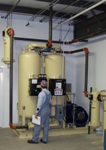Compressed air system audits and leak detection reviews determine if your system is operating at peak efficiency. An RHM audit trends your systems performance and provides quantitative data that will clearly illustrate how efficiently that system is operating over time. Key benefits of auditing, include:
- Reduced operating costs
- Improved productivity and reliability
- Better product quality
- Reduced capital spending
- More stable system pressure

The audit solution is typically a six-step process:
1. Pre-audit feasibility study that targets in on your specific issues so you will know what to expect and what opportunities for improvement may exist before committing to spend money.
2. Actual audit at which time the auditor will collect information about your system using state-of-the-art data acquisition equipment to gain an accurate picture of how your system truly operates.
3. An audit report is generated that illustrates how your system is currently operating and a detailed analysis of ways to improve system performance. The report will include recommendations, control configurations and financial justifications to meet your return on investment needs.
4. At the planning phase, RHM and IR will provide direction and assess options on how to act on audit report recommendations.
5. Project management is available to implement changes whether it is through project supervision of your people or by full RHM / IR turn-key project implementation and management.
6. Validation is the final step whereby optional testing services can be made available for any component or for the entire air system to ensure recommendations made through the audit process delivered promised results.